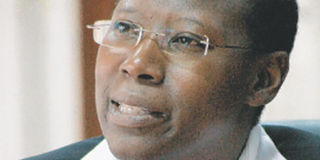Same-sex unions are illegal, retired judge tells panel

Retired judge Violet Mavisi before the Judicial Service Commission vetting applicants for the position of judges of the Supreme Court at Anniversary Towers June 10, 2011. PHOEBE OKALL
The interview panel for Supreme Court candidates Friday questioned retired judge Violet Mavisi about how she would apply the Constitution on abortion and same-sex marriages, if appointed.
At the same time, Mombasa-based judge Jackton Boma Ojwang was pressed to defend his judgments which the Court of Appeal had overturned, on the fifth day of the interviews.
They were the last to face the Judicial Service Commission (JSC) panel this week, and were questioned on their suitability, including past judgments and writings, relevant experience and legal philosophy.
JSC member Emily Ominde asked retired judge Mavisi: Does Article 26(4) allow abortion, and does Article 45(2) allow same-sex marriages?”
The candidate responded that those sections were clear.
“The Constitution is very clear: same-sex relations are not allowed. The law says – and it is very clear – abortion is not allowed,” she said adding that the Constitution, however, gave an exception for the latter.
“The court will have to determine whether the mother’s life was in danger,” she said.
She told the panel that, if appointed, she would take to the Supreme Court her vast experience on human rights issues, which she said she had gathered from the time she was a member of the National Commission on Human Rights, a public prosecutor, a consultant and an advocate.
Mr Justice Ojwang, who holds a PhD in law from the University of Cambridge – although winning praise from panellist Amos Wako for his distinguished academic work – was in the spotlight over some of his rulings that the Court of Appeal later quashed.
But yesterday he got a chance to criticise the decisions: “Some of the Court of Appeal’s authorities were not constitutional.”
“We must do what is right, but we cannot go by certain technical criteria and deny someone his rights.”
He told the panel that if appointed, he would bring on board his deep understanding of the law, and a wide exposure in international law.




